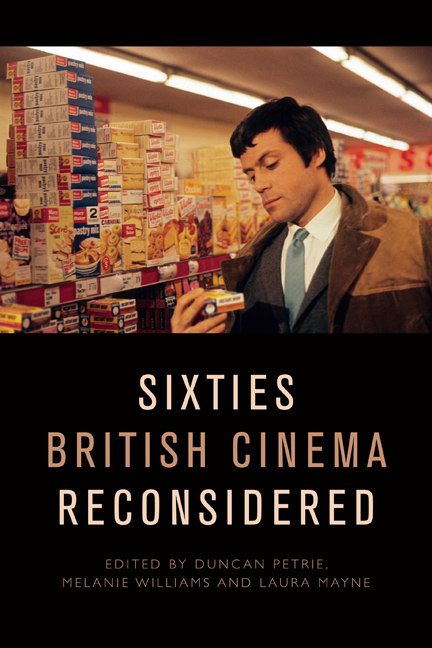Book contents
- Frontmatter
- Contents
- List of Figures and Tables
- Notes on the Contributors
- Introduction
- PART ONE STARS AND STARDOM
- 1 Male Stardom in 1960s British Cinema
- 2 ‘Rebel Rebel’?: Oliver Reed in the 1960s
- 3 Carol White: The Bardot of Battersea
- 4 ‘The Old Wave at Work’: The Transatlantic Stardom of the British Character Actress in the 1960s
- PART TWO CREATIVE COLLABORATIONS
- 5 Woodery-pokery: Charles Wood’s Sixties Screenwriting
- 6 ‘Beyond Naturalism’: Jocelyn Herbert, If . . . (1968) and Design for Performance in 1960s British Cinema
- 7 Kes: From Page to Screen
- 8 ‘I’d like to remember you as you are – as just a grumpy old man’: Joseph Losey and the Making of Figures in a Landscape (1970)
- PART THREE STYLE AND GENRE
- 9 ‘Wholesome rough stuff’: Hammer Films and the ‘A’ and ‘U’ Certificate, 1959–65
- 10 Widescreen Pyrotechnics: Shot Composition and Staging in the Cold War Films of Joseph Losey and Sidney J. Furie
- 11 The Rise and Fall of the Colourful Corporate Fantasy in 1960s British Cinema
- 12 Witchfinders and Sorcerers: Sorcery and Counterculture in the Work of Michael Reeves
- PART FOUR CULTURAL TRANSFORMATIONS
- 13 ‘An Impulse of Anger, Instantly Regretted’: Rebellion and Reaction in the Early-1960s Naval Film
- 14 Narratives of Race and Identity in Sixties British Cinema
- 15 Panic at the Disco: Brainwashing, Alienation and the Discotheque in Swinging London Films
- Index
14 - Narratives of Race and Identity in Sixties British Cinema
Published online by Cambridge University Press: 22 September 2020
- Frontmatter
- Contents
- List of Figures and Tables
- Notes on the Contributors
- Introduction
- PART ONE STARS AND STARDOM
- 1 Male Stardom in 1960s British Cinema
- 2 ‘Rebel Rebel’?: Oliver Reed in the 1960s
- 3 Carol White: The Bardot of Battersea
- 4 ‘The Old Wave at Work’: The Transatlantic Stardom of the British Character Actress in the 1960s
- PART TWO CREATIVE COLLABORATIONS
- 5 Woodery-pokery: Charles Wood’s Sixties Screenwriting
- 6 ‘Beyond Naturalism’: Jocelyn Herbert, If . . . (1968) and Design for Performance in 1960s British Cinema
- 7 Kes: From Page to Screen
- 8 ‘I’d like to remember you as you are – as just a grumpy old man’: Joseph Losey and the Making of Figures in a Landscape (1970)
- PART THREE STYLE AND GENRE
- 9 ‘Wholesome rough stuff’: Hammer Films and the ‘A’ and ‘U’ Certificate, 1959–65
- 10 Widescreen Pyrotechnics: Shot Composition and Staging in the Cold War Films of Joseph Losey and Sidney J. Furie
- 11 The Rise and Fall of the Colourful Corporate Fantasy in 1960s British Cinema
- 12 Witchfinders and Sorcerers: Sorcery and Counterculture in the Work of Michael Reeves
- PART FOUR CULTURAL TRANSFORMATIONS
- 13 ‘An Impulse of Anger, Instantly Regretted’: Rebellion and Reaction in the Early-1960s Naval Film
- 14 Narratives of Race and Identity in Sixties British Cinema
- 15 Panic at the Disco: Brainwashing, Alienation and the Discotheque in Swinging London Films
- Index
Summary
Among the many ‘liberations’ of the 1960s were the changing racial and interracial identities of the UK population as a new multiculturalism began to emerge. As Britain's ethnic composition became increasingly complex, new intercultural relations were forged in the shadow of Civil Rights struggles in the United States, where during the course of a divisive decade some of the fundamentals of racial equality remained unachieved. The older world of Britain was itself undergoing rapid change, with the diminution of the former British Empire as many of its former colonies in Africa and the Caribbean moved into independence and thus into a new relationship with the former ‘mother country’ under the umbrella of the fast-expanding Commonwealth. At home change was powered by the Windrush generation and subsequent migrations, while successive stages of race legislation attempted to regulate Britain's new multicultural mix, with a focus on vexed questions of post-imperial nationhood and citizenship.
In turn, new forms of black cultural organisation and expression emerged and fought against predictable forms of resistance to change. British cinema provided a variety of responses to the new situation. These included a range of films appealing, nostalgically and/or critically, to the long years of empire; features dealing with contemporary themes which sought to dramatise the new multiculturalism from both optimistic and less positive perspectives; and the fragile beginnings, through the vehicle of the independent short film, towards an authentically ‘black’ cinema in Britain. The latter development would eventually culminate in the first British feature film to be centrally concerned with the lives of black Britons and made by a black director, Horace Ové's Pressure (1976), following his documentaries Baldwin's Nigger (1969) and Reggae (1970). This chapter offers a survey of those different kinds of films, culminating in analysis of one film from the period which, despite its evident interest, has languished in critical obscurity, Ted Kotcheff's Two Gentlemen Sharing (1969).
The 1960s produced films as different as Till Death Us Do Part (1968) and Lawrence of Arabia (1962), both focusing on male outsiders, but one looking back nostalgically to an older dispensation, the other looking forward to new intercultural formations. If Lawrence marked a new post-imperial understanding of the global struggles of the First World War, then other sixties films looked still further back, typically to mourn the loss of empire through dramas involving great defeats by earlier foes in Africa.
- Type
- Chapter
- Information
- Sixties British Cinema Reconsidered , pp. 223 - 238Publisher: Edinburgh University PressPrint publication year: 2020

